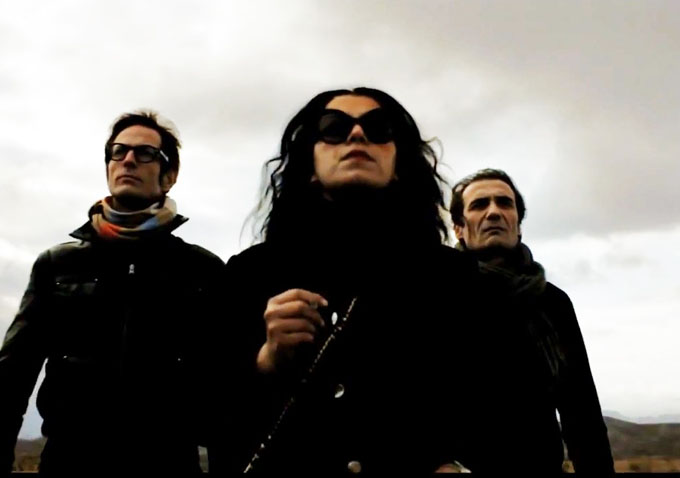 For her third feature film after 2007's beloved "Persepolis" and 2011's "Chicken with Plums," writer-director Marjane Satrapi changes it up once again with "The Gang of the Jotas" ("La Bande des Jotas") which bows today Out of Competition at the Rome Film Festival. Having made the move, with her previous films, from black-and-white animation, to stylized, heavily art-directed live action, here she throws both those styles out of the window and turns in a loose, black comedy road movie that feels, for the most part, about as un-stylized as you can get. With no particularly pretty pictures to hide behind, the writing, plotting and characterization of this piece are more foregrounded than in any of her previous films. Good news, then, that while the film feels like a minor work, for the majority of its running time it's a wickedly enjoyable caper movie in which the humor, always dark, ranges from the deadpan to the slapstick, but almost always finds its mark.
For her third feature film after 2007's beloved "Persepolis" and 2011's "Chicken with Plums," writer-director Marjane Satrapi changes it up once again with "The Gang of the Jotas" ("La Bande des Jotas") which bows today Out of Competition at the Rome Film Festival. Having made the move, with her previous films, from black-and-white animation, to stylized, heavily art-directed live action, here she throws both those styles out of the window and turns in a loose, black comedy road movie that feels, for the most part, about as un-stylized as you can get. With no particularly pretty pictures to hide behind, the writing, plotting and characterization of this piece are more foregrounded than in any of her previous films. Good news, then, that while the film feels like a minor work, for the majority of its running time it's a wickedly enjoyable caper movie in which the humor, always dark, ranges from the deadpan to the slapstick, but almost always finds its mark.
Satrapi also stars as the central character, an unnamed woman we first meet in a Spanish airport having collected her bag off the carousel. But when she gets to her hotel, she discovers it's the wrong bag (this one is full of badminton paraphernalia), and arranges an exchange. The owner of the bag, Nils (Mattias Ripa, also the Line Producer), arrives with his friend Didier (Stephane Roche, also the Editor) — they are amateur badminton players traveling to Spain for a tournament — and, despite themselves, the two get sucked into the weird vortex of the woman's life. Her story, which she reveals piecemeal to them, involves the titular gang, a group of mafiosos whose names all begin with J (jota), who have killed her sister and are trying to kill her too. It sounds like a tall tale, but when Nils and Didier accompany her to buy a gun for her defense, and Nils then panics and uses that gun, the three of them find themselves bound together on a road trip that turns increasingly into a killing spree.
The mordant tone is maintained by the deadpan performances from the double-jobbing cast, and Satrapi herself is terrific as the mysterious woman, who morphs gradually from dotty, scatty, chatty fabulist to crimson-lipped puppet master — the ruthless mastermind and centre of this unlikely trinity. And as director, here her compositional eye is for the surreal, or the odd (we can't use the word "wacky" without wanting to die, but perhaps it applies here), rather than the pretty. It all adds up to an enjoyable cocktail, and if it feels a little disposable next to her acclaimed debut, and next to the lofty themes of tortured artistry in her followup, well, so what? It's exciting that we have here a filmmaker who is so brazenly keen to change her MO from one project to the next.
The problems lie elsewhere. Black comedy is among the hardest genres to do well, requiring a peculiar balance of elements to be sustained all the way through. And Satrapi is almost successful in pulling it off — almost, but not quite. Having been so assured and dynamic and funny for the first two acts, the pace slackens in the third, and the originality and energy that has abounded until then seems to dissipate. And the final scene, at a party (thrown by now regular Satrapi collaborator Maria de Madeiros) is a misfire, the revelations it brings forth are hardly revelatory, and the attempt at a "…" ambivalent ending just feels unsatisfying. It's as though Satrapi, having had such a great time along the way, can't quite work out the story's ending, and so doesn't really give it one. "The Gang of the Jotas" is a film that confirms Satrapi's eclectic, eccentric talent and her wicked eye for the absurd, but it can't quite stick the landing. [B]

